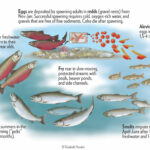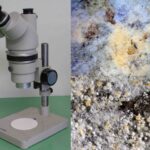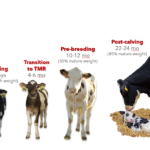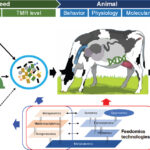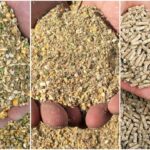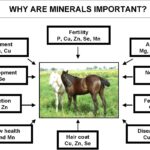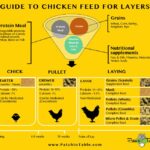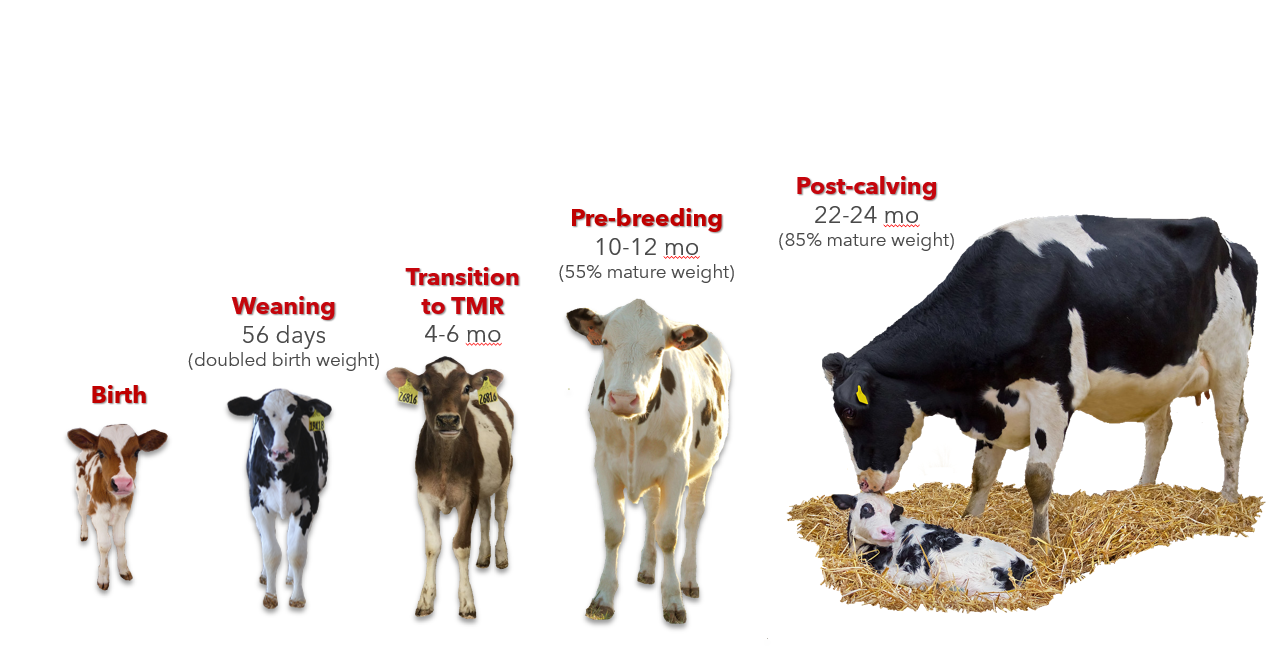Nutrition plays a critical role in the health, productivity, and overall performance of ruminants. Ruminant animals, such as cattle, sheep, goats, and buffalo, have a unique digestive system that allows them to efficiently process fibrous plant material. Their nutritional needs vary depending on the stage of life, production status, and environmental conditions. Proper nutrition is essential for body maintenance, growth, production (such as milk and wool), and reproduction.
1. Nutrition for Body Maintenance:
Body maintenance is the most basic and essential function of nutrition. It involves maintaining the animal’s bodily functions, including the functioning of organs, immune system, and other physiological processes, without the need for growth or production.
• Energy Requirements:
o Energy is required for the animal’s daily activities, including movement, digestion, and thermoregulation. The primary source of energy for ruminants is carbohydrates, primarily from fiber (cellulose) found in forages like grasses, silage, and hay.
o In addition to fiber, ruminants may also rely on some concentrate feeds, such as grains, for easily digestible energy.
• Protein Requirements:
o Protein is vital for repairing and maintaining body tissues. Ruminants require both rumen-degradable protein (RDP) and rumen-undegradable protein (RUP) in their diet.
o RDP is degraded by microbes in the rumen and converted into microbial protein, which provides essential amino acids. RUP, on the other hand, bypasses the rumen and is digested in the small intestine, providing additional amino acids.
• Vitamins and Minerals:
o Ruminants require a range of vitamins (A, D, E, K) and minerals (calcium, phosphorus, magnesium, trace minerals like zinc, copper, iodine, etc.) to support metabolic functions, bone health, and immune system strength.
o Minerals such as sodium, potassium, and chloride are required to maintain electrolyte balance and hydration.
• Water:
o Water is an essential nutrient for maintaining body temperature, digestion, and all metabolic processes. It supports nutrient transport, waste elimination, and ensures hydration, especially in hot climates.
2. Nutrition for Growth:
Growth is the process by which ruminants increase in body size, muscle mass, and fat deposition. Proper nutrition during growth stages is essential for achieving optimal size and health.
• Energy for Growth:
o Energy is the primary requirement during growth, as it supports cell division, tissue growth, and development. The energy needs of growing ruminants are higher than for maintenance, and a balanced energy source is necessary for optimal growth rates.
o A higher intake of digestible fiber or concentrates (grains) may be required to meet the energy needs of growing animals.
• Protein for Growth:
o Adequate protein intake is critical to support the synthesis of muscle and connective tissues. As growth accelerates, especially in young ruminants, the demand for amino acids increases.
o A balance between RDP and RUP is important to ensure the animal gets enough protein for microbial synthesis in the rumen and for the small intestine’s absorption of bypass protein.
• Minerals and Vitamins for Bone Development:
o During growth, ruminants require additional minerals like calcium, phosphorus, and magnesium to support bone development and structural integrity.
o Vitamins such as vitamin D are essential for calcium absorption and bone health.
• Growth Stage Considerations:
o The growth phase is particularly critical in young ruminants, where the diet should be nutrient-dense to ensure they reach their target weights and sizes for efficient future production or reproduction.
3. Nutrition for Production (Milk, Meat, Wool, and Other Products):
Ruminants are used for various products, including milk, meat, wool, and hides. Nutrition directly influences the quantity and quality of these products.
Milk Production:
• Energy and Protein for Lactating Animals:
o Lactating ruminants, such as dairy cows, have high energy and protein demands. Milk production requires substantial energy for the synthesis of lactose, and protein is necessary for milk protein synthesis (casein, whey).
o The energy balance should be closely monitored to avoid negative energy balance, where energy output (milk production) exceeds intake, leading to body condition loss, decreased milk production, or even health issues like ketosis.
• Fatty Acids for Milk Quality:
o The diet should include adequate amounts of essential fatty acids (omega-3 and omega-6) to influence milk fat composition. The type of fat in the diet can affect the fatty acid profile in milk, including the presence of beneficial omega-3s.
• Vitamins and Minerals for Milk Quality:
o Calcium and phosphorus are critical for milk production, as they are required for proper milk secretion and bone health.
o Adequate intake of vitamins A, D, and E supports overall milk production, immune function, and reproductive health in lactating animals.
Meat Production:
• Energy for Meat Growth:
o Adequate energy is essential for increasing body weight and fat deposition. Energy in the form of carbohydrates (from roughages) and fats (from grains or concentrates) is required for optimal meat production.
• Protein for Muscle Development:
o Protein, particularly RDP for microbial growth in the rumen and RUP for direct absorption in the intestines, is necessary for muscle growth. The quality and quantity of protein intake directly affect meat yield and quality.
• Minerals and Vitamins for Meat Quality:
o Trace minerals like zinc and copper are involved in the proper formation of muscle tissue, while vitamins such as vitamin E are essential for meat tenderness and quality.
Wool Production (for Sheep):
• Energy for Wool Production:
o Wool is composed mainly of keratin, a protein, so protein intake is crucial for wool growth. Energy is also required for the synthesis of amino acids, which make up the wool fiber.
• Protein and Amino Acids for Wool Quality:
o A well-balanced diet that includes both rumen-degradable and rumen-undegradable protein is needed for optimal wool growth and fiber quality.
• Minerals for Wool Quality:
o Adequate intake of sulfur-containing amino acids is important for wool formation. Zinc and copper also play a role in the health of wool and the skin.
4. Nutrition for Reproduction:
Proper nutrition is essential for both the male and female ruminants’ reproductive success. Nutrient intake before and during mating, pregnancy, and lactation influences conception rates, fetal development, and overall reproductive health.
• Energy and Protein for Reproductive Success:
o Both energy and protein are critical for reproductive performance. Underfeeding or overfeeding can reduce fertility in both males and females. Negative energy balance, especially in females, can lead to delayed estrus, reduced conception rates, or early abortion.
o Protein is necessary for proper hormonal balance, ovarian function, and sperm production in males.
• Minerals and Vitamins for Reproductive Health:
o Calcium and phosphorus play a role in maintaining healthy bones, as well as ensuring smooth muscle function during labor.
o Trace minerals like iodine are essential for thyroid function, while selenium and vitamin E are crucial for reproductive performance and preventing reproductive failure.
• Fetal Development:
o During pregnancy, especially in the later stages, the nutritional needs of the pregnant female increase. Adequate protein, energy, vitamins, and minerals are essential for the development of a healthy fetus, especially for the formation of organs, muscle, and bone.
Conclusion:
Proper nutrition is vital for the optimal health, growth, production, and reproduction of ruminants. By providing balanced diets that meet the specific needs of animals at different life stages and production levels, farmers can ensure that animals are healthy, productive, and capable of reaching their full genetic potential. The proper balance of energy, protein, vitamins, and minerals is crucial to maximize performance, reduce the risk of health issues, and optimize farm profitability.
Thank you for reading. Don't forget to subscribe & share!

